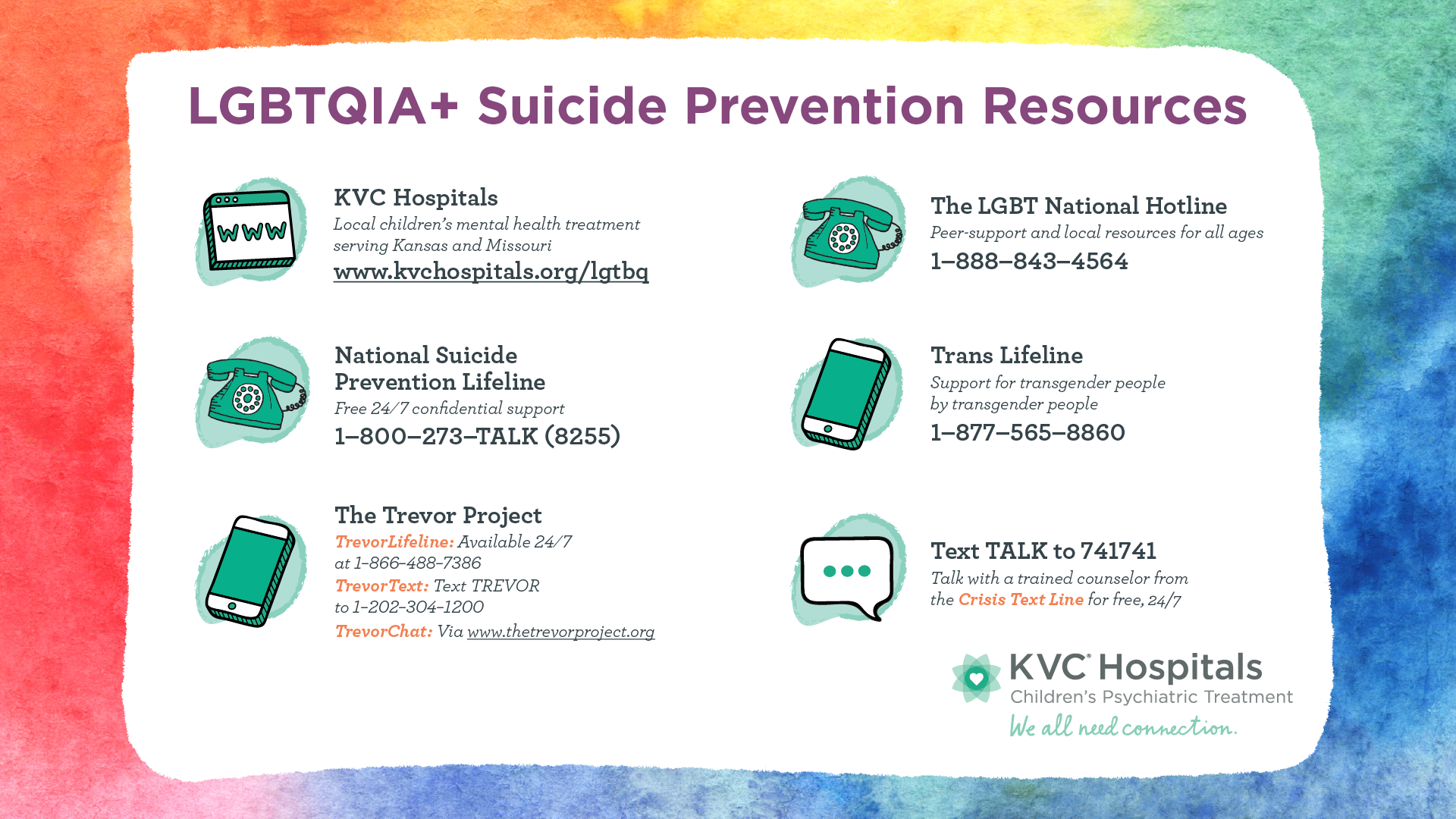Suicide Prevention: How We Can Support LGBTQIA+ Youth Mental Health

Mental health can pose many challenges for young people, and the statistics are particularly startling for LGBTQIA+ youth. But there are many ways to support LGBTQIA+ youth in your life.
In a 2021 survey of more than 35,000 LGBTQIA+ youth, 42% stated they seriously considered attempting suicide in the past year, including more than half of transgender and nonbinary youth. Additionally, 94% of youth surveyed reported that recent politics had negatively impacted their mental health and 75% reported experiencing discrimination based on their sexual orientation or gender identity at least once in their lifetime.
The Trevor Project estimates that more than 1.8 million LGBTQIA+ young people (ages 13-24) seriously consider suicide each year in the United States, and at least one attempts suicide every 45 seconds.
Young people are always looking for a place to be heard, find acceptance for who they are and feel the love and compassion they deserve. But for LGBTQIA+ young people, that may not be the reality.
Research suggests that among LGBTQ youth, just one-third experience parental acceptance. An additional one-third experiencing parental rejection, and the final one-third didn’t disclose their LGBTQIA+ identity until becoming adults. Rejection and trauma are heartbreaking for a child and can negatively impact their brain development, mental health and their long-term wellbeing.
These numbers may be grim, but there is some good news: You can make a monumental difference in the lives of LGBTQIA+ youth. Having even just ONE accepting adult can positively impact the life of an LGBTQIA+ young person and reduce the risk of suicide by 40 percent, according to a national LGBTQIA+ report. If you are a caregiver for a child who identifies as LGBTQIA+, you have the power to be a positive influence with gender-affirming care.
What You Can Do to Support LGBTQIA+ Youth
You have the power to help prevent a mental health crisis for LGBTQIA+ youth. As you interact with a child, remember that we’re all unique. What helps someone might not support someone else. However, each time you reach out and attempt to uplift a young person, your effort will be noted.
Read through these ideas to support LGBTQIA+ youth and consider what might resonate most with the young people in your life.
Interact with Acceptance
While some children grow up hearing from loved ones that they’re special, important and deserving of anything they can dream of, not everyone does. Positive reinforcement is essential for every child to feel accepted. It may sound simple, but telling an LGBTQIA+ child that they matter can make a significant impact.

Acceptance and support by family members or other caregivers has a huge impact on a LGBTQIA+ youth. One report revealed that this support and acceptance is associated with greater self-esteem, social support, general health status, less depression, less substance abuse and less suicidal ideation and behaviors among LGBTQIA+ youth.
Providing acceptance and affirmation begins with the simple ways you interact. The USC School of Social Work suggests basic guidelines to show youth acceptance and openness. These gender-affirming guidelines include staying curious, making eye contact, managing your body language and using inclusive language, such as using preferred pronouns.
Speak without Judgment
Part of creating a safe place for LGBTQIA+ youth is offering a judgment-free zone for important conversations. Position yourself as a trustworthy, safe person they can speak openly to about their emotions and struggles.
During these conversations, make sure to be fully present and set aside any daily distractions. Your presence is a reflection of how much you care and how much you value them. Listen generously and feel the emotion behind their words. If you feel yourself begin to slip into judgment, ask yourself what’s causing you to have that reaction. Above all, remember to speak and interact with respect and equality.
Watch for Mental Health Warning Signs
The mental health dangers to LGBTQIA+ youth are pressing and life-threatening. While there may be many things you can do to help improve a young person’s mental health, this should never be replaced by assessment and support from a medical professional. Their training and experience is priceless, especially when it comes to preventing suicide.
Having a professional assess a child’s mental health, especially in the face of challenges, can be key to their continued success. Whether speaking with a physician or mental health professional, make mental health a priority.
Concerned that an LGBTQIA+ young person in your life may be struggling with their mental health? Here are some common signs and symptoms:
- Drastic mood changes, such as increased anxiousness, sadness, irritability or anger
- Talking about feeling hopeless, wanting to die, or that there’s no point to life
- Excessive crying or irritation
- Unusual fatigue or reduced energy
- Complaining of unexplained headaches, stomach aches or body pains
- Changes in sleeping habits (including sleeping too little or too much) or eating habits (including eating too little or too much)
- Difficulties paying attention and concentrating (including forgetfulness and distraction)
- Withdrawing from family and/or friends, or withdrawing from activities they usually enjoy
- Returning to outgrown behaviors (for example, thumb-sucking or bedwetting)
- Self-harming or harming others
- Use of alcohol, tobacco or other drugs
- Poor school performance or avoiding schoolwork
Counseling can be a tremendous tool for an LGBTQIA+ young person. Even if they’re not experiencing a mental health crisis, speaking with a professional can help.
Download and print this resource sheet to share with your family and friends:
Introduce a Community
The loneliness of being an LGBTQIA+ youth can be overwhelming. Helping these young people find a safe place where they can be heard and find supportive connections can ease troubles in a hurtful world.
 Research shows these communities offer meaning and significance through shared interests, hobbies and pursuits. Creating these connections is also shown to promote mental health and social wellbeing. As a caring adult, you can help youth find a safe community to express themselves and find greater social acceptance.
Research shows these communities offer meaning and significance through shared interests, hobbies and pursuits. Creating these connections is also shown to promote mental health and social wellbeing. As a caring adult, you can help youth find a safe community to express themselves and find greater social acceptance.
Every person deserves compassion, love and to be accepted as who they truly are. Every action you take to support LGBTQIA+ youth has the potential to save a life and help create a much-needed support system. At KVC Health Systems, we’re here to support every child we serve and provide the best possible resources for their care. Did you know that if you’re an LGBTQIA+ adult, you can foster or adopt? It’s true! Learn more about becoming a foster parent.






